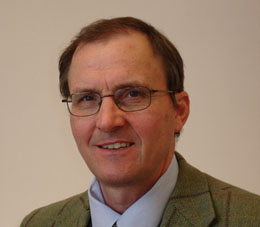Top government post for St Andrews scientist

Professor Ian Boyd has been appointed by Defra (Department for Environment Food and Rural Affairs) to be its new Chief Scientific Adviser.
Professor Boyd, who is the current Director of the Scottish Oceans Institute and the Sea Mammal Research Unit at the University of St Andrews, will join Defra in September on a three year contract.
He will replace Professor Sir Bob Watson, who is leaving Defra after five years in the post.
Professor Boyd however is to maintain his links with St Andrews and Scotland. Defra has agreed to allow him to pursue his own academic interests one day per week and he is to step into a new role at the University, as Adviser to the Principal’s Office on Knowledge Exchange, an area of key strategic focus for St Andrews.
Commenting on his appointment, Professor Boyd said:
“I am delighted to be taking up this important position. Scientific evidence is at the centre of most of Defra’s policies and I wish to ensure this approach is sustained. There are substantial future challenges ahead in bio-security, food security and in responding to the effects of climate change, but the UK is well placed to meet these challenges. It has excellent scientific research and I look forward to helping stimulate this research community to even greater things in future. I also look forward to listening to people’s concerns about controversial issues around the management of our environment.
“While I am not leaving the University completely, and the new job is initially only for 3 years, this does represent a significant change. I owe much to the University and my colleagues across the School of Biology, SMRU and SOI for their support over the years.
“Defra has generously given me notionally one day per week to pursue my own interests and the Principal has, equally generously, agreed that I can spend these within the University.”
St Andrews Principal and Vice-Chancellor Louise Richardson said:
“Defra are appointing a scientist of the highest academic calibre to this important post, and while we will miss the leadership and academic energy which Ian has brought to his current role, we feel proud that the Government came to St Andrews to identify the best.
“We are delighted that Professor Boyd is to maintain his links with the University and take up a new role with us as Adviser on Knowledge Exchange.”
Environment Secretary Caroline Spelman said:
“Scientific evidence is absolutely crucial at Defra and helps us make the right decisions on how to protect and improve the environment. I have been immensely grateful for the scientific advice and oversight of all our research by Sir Bob, and I look forward to working with Professor Boyd to continue the Department’s reputation for scientific excellence.”
The Chief Scientific Adviser (CSA) sits on Defra’s Management Board and is responsible for overseeing the quality of evidence that the department relies on for policy decisions. The CSA also provides Ministers with scientific advice and sets the priorities for scientific research and evidence gathering.
ENDS
Notes to Editors
Biography
Professor Boyd has been Director of the Scottish Oceans Institute at the University of St Andrews and the Sea Mammal Research Unit, a partner institute of the Natural Environment Research Council from 2001-2012. He was responsible for the creation of the Marine Alliance for Science and Technology for Scotland in 2009, a partnership of nine institutions conducting marine science across Scotland. He is a member of the Scottish Science Advisory Council, chairman of a scientific advisory board on decommissioning for Oil and Gas UK and he also chairs the committee that monitors the environmental compliance around Europe’s largest oil terminal at Sullom Voe in Shetland.
Much of his career was spent in polar science when he worked for the British Antarctic Survey from 1987- 2001 where his interests were focussed on the behavioural and physiological ecology of Antarctic seals and the ecology and management of the Southern Ocean. More recently, he was Chief Scientist for a US Navy study examining the behavioural responses of whales to military sonar and he was a co-developer of environmental risk management procedures used by the Royal Navy. He served on two enquiries in to the future of Scottish Fisheries and the implications of Common Fisheries Policy reform for the Scottish Fishing industry and was recently a member of the Lenfest Forage Fish Task Force that recommended a global 50 per cent reduction in the level of fishing for some of the planet’s most abundant fish species.
Much of his recent research has focussed upon the effects of sound on marine life and this led to his role as co-chair of the International Quiet Oceans Experiment, a joint initiative of the Scientific Committee for Ocean Research and the Partnership for Observation of the Global Ocean.
He is on the Board of Reviewing Editors of Science and is a former Editor-in-Chief of the Journal of Zoology. He led his institute to receive the Queen’s Anniversary Prize in 2011. He has BSc and DSc degrees for the University of Aberdeen, a PhD from Cambridge University and has received prizes for his research including the Scientific Medal of the Zoological Society of London and the Bruce Medal for Polar Science from the Royal Society of Edinburgh. He is also a Fellow of the Royal Society of Edinburgh.
Issued by the Press Office, University of St Andrews
Contact Niall Scott, Director of Corporate Communications on 01334 462244/2530, 0771 122 3062 or email niall.scott@st-andrews.ac.uk
Ref: (boyd 240412)
View the University’s latest news at http://www.st-andrews.ac.uk/news/
Category Government